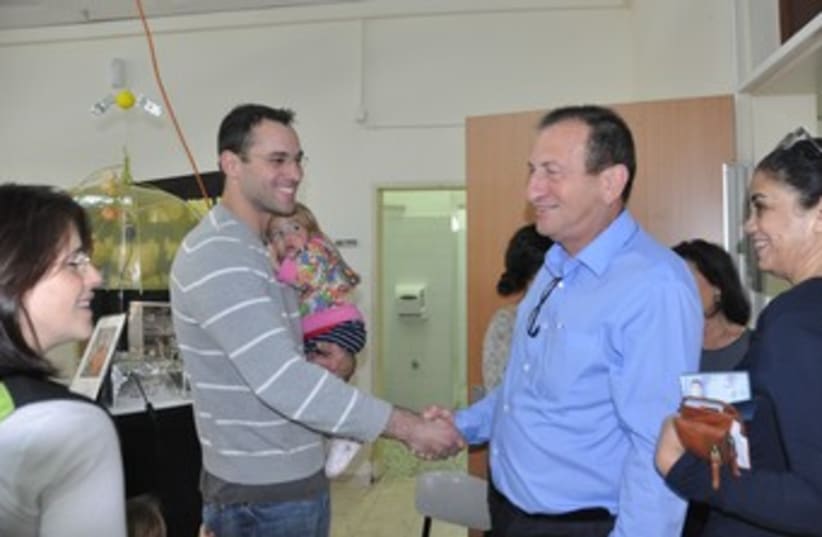* FORMER SCHOOLMATES from many parts of the world, as well as from Israel, flocked to the Achdut School in Kiryat Motzkin for a reunion organized by Herzl Bodinger, former commander in chief of the Israel Air Force. Some of the participants had not seen each other in more than 50 years, and in several cases had difficulty recognizing each other because time had radically altered their appearance. Some of their teachers – one of them aged 98 – also attended, and were among those sharing anecdotes.It seems that Bodinger was outstanding even as a schoolboy. One of the requirements of the school was that every student had to answer two questions: “What do you want to be when you grow up?”and “If you fail in your ambition, what will you do?” Bodinger, as a youngster who had not yet reached double-digit age, wrote that he wanted to be a pilot in the air force and an engineer. It was his second answer that made the school principal and all of his teachers sit up and take notice: “There is no such thing as failure,” he wrote. “If I decide that I want to do something, I will pursue that desire and I will succeed.” Indeed, he did.
* Tel Aviv Mayor Ron Huldai dedicated a square this week in memory of, was Israel Prize laureate, human rights activist and former attorney-general Haim Cohn, who was a Supreme Court justice and the first president of the Jerusalem-based Association of Civil Rights in Israel, better known as ACRI.
Prior to his appointment to the Supreme Court, where he served for 21 years, he was briefly justice minister; he had previously served in several senior positions in the ministry.Renowned for his scholarship and extensive knowledge of the law, he was also a member of the International Court of Justice in The Hague, which was this week addressed by President Shimon Peres on the day prior to the dedication ceremony of Judge Haim Cohn Square. There should therefore be no doubt that Haim Cohn has been honored in the city that never sleeps – even though for most of his life, the German-born Cohn was a resident of Jerusalem.Born into a religious family, Cohn, soon after his arrival in Jerusalem in 1930, studied at Merkaz Harav Yeshiva and was also a cantor in Mea She’arim.The fact that he had a good singing voice was not surprising, considering he was a cousin of the singing rabbi Shlomo Carlebach. In 1966, he caused something of a scandal when despite his background, he married divorcee Michal Smoira, a prominent musicologist, who was the daughter of Moshe Smoira, the first president of the Supreme Court. Michal Smoira had been twice divorced and once widowed; because of her beloved’s status as a kohen, as a divorcee she was halachically forbidden to him. Cohn defied the tenets of Jewish law and the marriage, which had initially made newspaper headlines, lasted for 36 years until his death in April 2002 at the age of 91.* FOR YEARS there has been controversy over the founding date of Tel Adashim, a northern moshav under the jurisdiction of the Jezreel Valley Regional Council: from when it was initially settled in 1913 by members of Hashomer, an organization which sought to protect the Jewish communities of Palestine and was disbanded in 1920; or from 1923, when the moshav was formally established with a slight alteration to its name, from Tel Adash to Tel Adashim. The original settlers had come to defend the pipeline from Iraq to Haifa, but by the time Hashomer as such ceased to exist, only two of the original families remained. The dispute as to whether Tel Adashim is 90 or 100 years old has still not been completely settled, but this week, the moshav, which 10 years ago celebrated its 80th anniversary, leapfrogged a decade and celebrated its centenary.Among the best known of its residents was Rafael Eitan, who had served as IDF chief of general staff, much beloved by the soldiers under his command.His father had been one of the founders of Hashomer. Eitan, popularly known as Raful, later became a MK and government minister. He is believed to have descended from a family of Subbotniks – Seventh Day Adventists who came from Russia to the Holy Land in the late 19th and early 20th centuries. Some Subbotniks converted to Judaism even in Russia. When asked whether he was indeed Jewish, Eitan, who died as a result of being swept out to sea in Ashdod in a freak accident in November 2004, consistently refused to answer.* THE TEL Aviv Arts Council, in partnership with the Tel Aviv Cinematheque, is hosting a film and discussion as part of its Israeli Cinema Series on Tuesday October 8 at 9 p.m. at the cinematheque. The film is Mivtza Savta (Operation Grandma), which has English subtitles; the discussion will be led by leading Israeli film critic Shmulik Duvdevani. The film, which is one of Israel’s comedy classics, won the 2000 Ophir Award.The screening is basically intended for young patrons of culture and the arts.